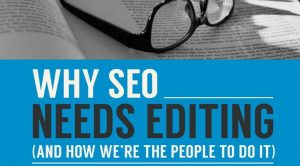This article was written based on a Search London presentation given by Charlie Williams, you can view the full slides here. Originally posted on white.net
“So, who edits your content?”
This simple question, asked innocently enough by a client, brings up the missing ingredient in many SEO campaigns. Editorial perspective.
This was the subject of a talk I gave at Search London recently. And it’s one of the most intriguing questions in SEO. Do we need SEO editors to make publication-worthy content?
On reflection, this question from our client was a fair one. They liked what we proposed for content to expand their relevancy within their niche. They agreed that new content to earn attention and links was needed.
They were asking who would bring all the disparate needs of the project together. Who considered SEO, but also the quality of the content, audience needs and demographics? Who recognised their brand voice and the technical limitations of their platform?
With other marketing disciplines, such as advertising or our above-the-line marketing counterparts, the client had an editorial figure. Someone who could speak to all the departments involved, commission tasks and bring a publishing perspective.
This made me realise we don’t explicitly recognise or covet editorial skills in SEO. We don’t see articles on using editorial techniques for SEO, the same way we do for say UX or copywriting.
An argument for SEO editors
I’ve worked in online marketing for a few years, and seen many things done in the name of SEO. Good and bad.
Much of that of course revolves around content. More now than ever. Frankly, much of what our industry produces is distinctly average. It ticks boxes. Yet more of it is awful. A waste of pixels, time and, most importantly, client budget.
This was predicted in a talk done by Doug Kessler of Velocity Partners. This stated (back in 2013) there would be a wave of poor content marketing. Content that looks the same as the good stuff at first, but is actually a poor experience, raising our audiences’ barriers.
And it’s all-too true in SEO. Last Summer Buzzsumo and Moz did a study into the correlation of social shares and links. What came out about content is important.
In a sample, 75% of content had no external links.
85% of content examined had less than 1,000 words.
This tells us a couple of things. Most of our content doesn’t work, and we lack the will or ability to produce long-form content. Even though we know it performs.
I think of SEO as a craft. You have the hard data side, that we use to inform the creative side. It’s one of the most enjoyable aspects of the job. But while we’ve begun to master data through analytics and research, our creative content is… well… hit and miss.
But when you consider where many of us have come from to find ourselves in SEO, perhaps it’s not a surprise.
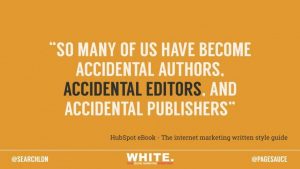
As SEO has evolved at a dizzying pace, many of us now specialise within a facet, such as outreach, technical SEO or analytics. There are even agencies dedicated to one of these niches.
With no-one talking about editing skills, its no wonder we’re not as armed as we should be.
But some of us are able to do so much more. To make content that works.
Why your SEO content sucks
So, what’s holding many of us back?
When people think of editing, they think of the track changes or spelling & grammar buttons in Word. Of having red lines run through their homework. This copyediting is not the summit of our ambition. Everyone can produce an article that is well-written.
We also have to get over the freedom blogging has given us. We’re comfortable with publishing with no restraint, no constrictions, no editorial control.
While that works fine for your home project, thinking we can publish anything for our clients in the quest for results doesn’t fly.
And that need for results is our biggest barrier. We invest in the results, not what gets the results. We lack editorial perspective. Links, shares, rankings are our aims for content marketing. Not quality, not traffic.
That’s why when you’re told, create quality content, most don’t explain what that entails.
Our approach of the content itself only being a mean to the end of links means we don’t approach with an attitude to succeed. The content has to work in its own right. Only then can most content hope to earn more.
It’s not just SEO targets; any time you try and apply other goals to content you can stifle creativity. It’s hard work to make great content. Using external measurements of success makes it more so.
Even as we move to ape the publisher model, we don’t think like editors. Some of the most successful content brands online treat their brands as web publications. Complete with editorial control.
In a world of Complex, Vox Media and Buzzfeed, do you serve your audience? These brands focus on their target user, serve them with (contextually) great content, and results come on the back of that.
Why you need to care
And these web publications are your competition. You might be in a different niche, but as we move to a content saturated world the most precious commodity becomes time.
Your target audience has access to more, and better quality, content than ever before. If you want your content to stand out, a well-written dull article targeting a few keywords written by someone with no insight won’t cut it.
We’ve also now got to live with Google’s E-A-T. Their desire for expert content within an industry. An example they give is that even gossip sites can demonstrate expertise.
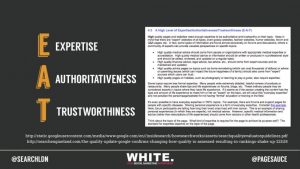
Add in last year’s Quality updates, Google took another step to rewarding expert, in-depth or other-wise superior content. Plus, it seems that engagement is another potential signof what earns that distinction.
If you think that an editor seems likely to match user intent to content, I agree. Who better than someone who can translate data, ideas, audience and brand?
An editor is someone who brings these different needs and world views together. They are the brand ambassador. Someone who has the skills of SEO, knows how to run an editorial process, can consider client needs and has the ingenuity to put it together.
As Seth Godin put it; “you need editors, not brand managers”.
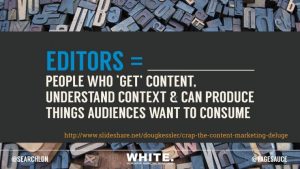
What would an editor do?
I’m glad you asked.
They bring together many of the skills & tasks that we currently have, but don’t explicitly assign. Then they add a depth of audience and brand understanding, a dash of creative flair, knowledge of publishing principles and the ability to see connections to create new ideas.
They write for readers. They make the content decisions.

The good news? We already do much of the work. We need to establish these into processes and re-enforce them with broader knowledge.
Back in the autumn, I gave a talk at BrightonSEO on establishing a content development environment. By combining SEO & keyword research skills with UX, social, content strategy and an agile approach (users first, quick turnaround), you create the foundations for content that serves a purpose. You take an editorial mindset into your content decisions.
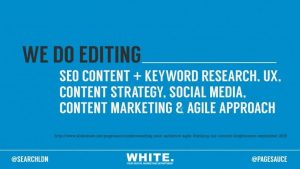
Another example? In a Whiteboard Friday from February, Rand Fishkin was speaking on the topic of combing granular keyword-led and topic-only approaches to content for SEO.
He spoke of combining your data, research and influences. Together they give you the basis for content decisions – something an editor of a web publication would use.
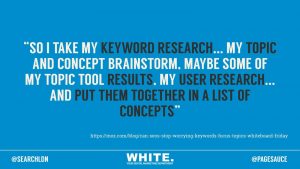
What an editorial perspective does is make many of our tasks easier.
Take personas. We have talked of them of years in SEO as we steal the best bits from UX. How many of us are good at understanding them? How much attention do we really pay to them?
In fact, for SEO, personas are more of an editorial consideration than for other channels. We’ve have to consider more than the multiple personas of our content consumers. There’s the persona of the industry influencers we want to target – what will make this content appeal to them? And then we have Google. As we learn more of what they look for in content, we have to consider them another persona our content must address.

This is a task editorial skills & tools improves.
Whatever you want to call this role, we need someone to take the reigns. Someone to understand SEO, the technical workings of your website, be in the heads of your audiences, be a guardian of the brand and understand the potential for promotion.
Oh, and be able to see connections to create new ideas and be able to lead creative teams.

So, should we have SEO editors?
This is of course an individual choice for most SEO teams, whether agency side or in-house.
What is less debatable is our need to step up our content game. And editorial skills will help get us there.
Should larger teams have an editor role?
Or can existing positions fill this need? We need technical, creative and strategic skills to succeed in SEO. As we hire specialists based on skills, should we look for those with an eye for publishing?
How do we give smaller teams the editorial skills they need?
Within smaller teams, we’re asked to be link builders, writers, data analysts, technical experts and more. Can we expect them to have editorial skills as well? How do we give these teams (or individuals) the skills and confidence to make content decisions?
Should we claim SEO editor as part of our lexicon?
We use many different titles for content lead. Maybe strategist, consultant or manager. But this prevents two benefits. One, us thinking explicitly about editorial skills when recruiting. And two, giving clients a clear understanding of the role and relationship they can expect. What title would you put more trust into guarding your brand? In making strong content decisions?
So, do I want to see SEO editors? Maybe. Do we need editing? Certainly.
If content is to be useful for linking building, we need those who can tell what an audience wants. What will form that mythical great content. That same great content most can’t explain because their focus is on the results, not on the content.
Being useful, such as educational, informative or entertaining is at the heart of online content. What better than an editorial philosophy to obsess with achieving this?
We’re moving towards an editorial model, a model of E-A-T. Can we adapt to take advantage?

